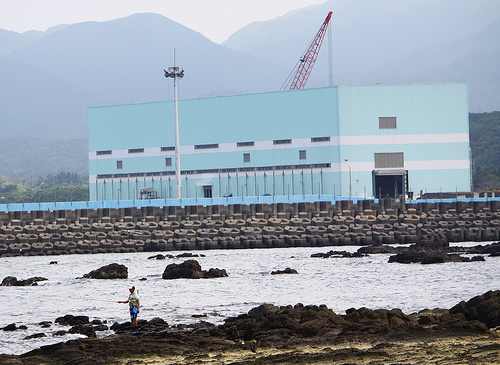Following the Fukushima nuclear accident in Japan [1], there are calls now for a review of Taiwan’s nuclear energy policy, particularly as a fourth nuclear power plant is now under construction.
Lin Tsung-yao (林宗堯), member of the Fourth Nuclear Power Plant Safety Monitoring Committee, has called upon [2] [zh] the Taiwan Power company to do a thorough reevaluation of construction of its fourth nuclear power plant:
核四廠卻是「拼裝產品」…台電發包設計,國內採購制度最常採取低價標…因產品採購時間及品質不一, 整個興建工序混亂…目前進入試運轉,也面臨原始顧問公司及「奇異」解約問題,缺乏有經驗的顧問監督。
The fourth nuclear power plant is an assembled plant… The Taiwan Power Company designed the plant itself and contracted out. When it purchased the parts in Taiwan, it usually chose the cheapest ones…Because these parts were purchased at different times and have different levels of quality, the proceedings of construction was a mess…Now test runs have begun, but we see problems like the cancelation of contracts with the original consulting company and General Electric. Therefore, we no longer have experienced consultants and supervision for this plant.
Roodo blogger Evette is also worried [3] about the problems that might occur during assembling of the plant:
我做工業設計的, 各個製造商像日立東芝三菱富士設計圖的小數點進位規格不同是確實的. 而那0.5mm的差別作機構的最清楚. 可以想像核電廠由那麼多上下游工廠出品的組件零件建構在一起, 其中的誤差所造成的後果可不是手機造壞了再造一台那麼簡單!
I am an industrial designer. It is true that producers like Hitachi, Toshiba, Mitsubishi, and Fuji have different rules for decimal point carrying on blueprints. The person who is responsible for machinery structure is very clear about the 0.5 mm difference (among the parts produced by different companies). We can imagine that if a nuclear power plant is assembled using numerous parts generated by many companies, the result of these kinds of errors are not as simple as errors in making cell phones, in which case we can make another cell phone easily.
Despite these safety concerns, Taiwan’s president Ma Ying-jeou [4] has said that [5] [zh] the government has dismissed calls by opposition lawmakers to halt the project, scheduled to go into operation in 2012.
Roodo blogger Summerlake has complained [6] that the government is not responding to professional concerns:
這樣的專業質疑,卻未曾得到重視,反而成為政府公關急著澄清、 掩蓋的"民眾疑慮"。
The government does not value these professional opinions. On the contrary, they consider these professional opinions as ‘some people’s doubts’ that should be ignored if they can't be clarified.
 [7]The fourth nuclear power plant under construction. Photo courtesy of Muhchyng [7] under a Creative Commons Attribution 2.0 Generic license [8].
[7]The fourth nuclear power plant under construction. Photo courtesy of Muhchyng [7] under a Creative Commons Attribution 2.0 Generic license [8].
On the other hand, when Taiwan’s largest electricity producer and monopoly grid operator, the state-run Taiwan Power Company, was asked what they would do if something like the Fukushima I Nuclear Power Plant accident were to happen in Taiwan, the company said they would take drastic measures to prevent a scenario from worsening. However, blogger Summerlake questions [6] if these so-called ‘drastic measures’ are practical in Taiwan:
而台電和原能會所謂的斷然措施,又怎麼以人民為優先呢?說穿了,頂多就是規劃了一個半徑五公里(頂多十公里)的撤退圈,但是也從來沒有演習或明確實施過, 萬一要擴大到二十公里,那就進入大台北範圍,環保團體預估要撤退160萬人,台電和原能會更是從來沒有構想過。到底是怎麼以人民為優先?
How can the drastic measures mentioned by the Taiwan Power Company and the Atomic Energy Council give priority to our citizens? To be straightforward, they will plan an evacuation area for a radius of 5 km (or as far as 10 km). Yet, they never rehears how people in this area are to be evacuated. If a situation does develop and we need an evacuation area with a radius of 20 km, the evacuation area would include Taipei city. If this happens, it is estimated by environmentalists that 1.6 million citizens would take part in the evacuation. If the Taiwan Power Company and the Atomic Energy Council won't consider such a scenario, how can they say they will give priority to our citizens?
台電和原能會言下之意更把核災撤退,當作是暫時傷害,像地震搖過就沒事一樣…可是,核災一旦發生,當地輻射污染可能持續數年,更遑論輻射塵擴散.
What the Taiwan Power Company and the Atomic Energy Council mean is that a nuclear power plant accident can only cause temporary damage like an earthquake. Nevertheless, if there is a nuclear power plant accident, the radiation pollution will persist for many years, never mind the spread of radiation dust.
Observing the responses of the Taiwan Power Company when it faces the questions regarding the safety issues of the fourth nuclear power plant raised [9] by Yoichi Kikuchi,
Chiong-Yue Li concludes [10] with:
台電過度自滿, 核安最大危機.
The complacency of the Taiwan Power Company is the most serious crisis for nuclear safety.
 [7]The fourth nuclear power plant under construction. Photo courtesy of Muhchyng [7] under a Creative Commons Attribution 2.0 Generic license [8].
[7]The fourth nuclear power plant under construction. Photo courtesy of Muhchyng [7] under a Creative Commons Attribution 2.0 Generic license [8].